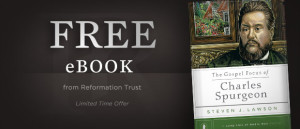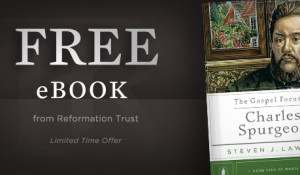 I pick up the review of Steve Lawson’s book “The Gospel Focus of Charles Spurgeon” in chapter 3 (page35). The chapter title is “Sovereign Grace”. The never ending debate between Calvinism and Arminianism had all but disappeared as Spurgeon came preaching. The preaching of the puritans and the reformers were fading fast. But now so with Spurgeon. In this chapter, Lawson reminds all readers and preachers who love to quote Spurgeon that he refused to become “infatuated with the current theological fads.” Spurgeon refused and chose the old paths, the path through Scripture. The language of Scripture was the language Spurgeon spoke.
I pick up the review of Steve Lawson’s book “The Gospel Focus of Charles Spurgeon” in chapter 3 (page35). The chapter title is “Sovereign Grace”. The never ending debate between Calvinism and Arminianism had all but disappeared as Spurgeon came preaching. The preaching of the puritans and the reformers were fading fast. But now so with Spurgeon. In this chapter, Lawson reminds all readers and preachers who love to quote Spurgeon that he refused to become “infatuated with the current theological fads.” Spurgeon refused and chose the old paths, the path through Scripture. The language of Scripture was the language Spurgeon spoke.
Lawson shows that for Spurgeon, “Preaching the Bible meant preaching Calvinism.” And for Spurgeon, he “never whispered anything.”
When I first began to read sermons by Spurgeon, I began to discover his clear position and defense of Calvin. Lawson points this out frequently in this section of the book. For Spurgeon, Calvin was only preaching what Paul preached. I’ve continued reading Spurgeon’s sermons over the years. I’ve often found myself praying that I might understand what Spurgeon did about the “doctrines of grace”. I’ve come to embrace this title over Calvinism only because I find so few people are willing to learn what Calvin taught on the doctrines of grace. Calvin clearly understood that salvation is 100% the work of God and that too, the preacher of the Bible must preach the Gospel, calling men to repent and believe. For Spurgeon’s Gospel focus, this was not a conflict for a sovereign God who rules and elects to hold man responsible at the same time. In Chapter Three, Lawson helps show this beautiful truth as Spurgeon preached.
Lawson did a masterful job of taking the five truths that constitute the doctrines of grace and show how Spurgeon focused his preaching from this vantage point. This is among some of the strongest support I’ve ever read in a short amount of words. I give Lawson an A+ for his helpful work here. This alone makes this book worth reading for me.
There are only a few more days left to get a free download of this eBook. Click HERE to get it.
“It is no novelty, then, that I am preaching; no new doctrine. I love to proclaim these strong old doctrines, that are called by nickname Calvinism, but which are surely and verily the revealed truth of God as it is in Christ Jesus.” (page 35)
I do not believe that we preach the Gospel unless we preach the sovereignty of God in His dispensation of grace; nor unless we exalt the electing, unchangeable, eternal, immutable, conquering love of Jehovah, nor do I think we can preach the Gospel unless we base it upon the special and particular redemption of His elect and chosen people which Christ wrought out upon the cross; nor can I comprehend the Gospel which allows saints to fall away after they are called.” (page 36)
“the result, he said, is that ” a very hell of corruption lies within the best saint.” Spurgeon recognized that sin lies deep within the souls of even the best of men. This inward corruption makes every man a savage beast: “There is no beast in wolf or lion or serpent that is so brutish as the beast in man.” All people are spiritually dead, unable to see, desire, or respond to the gospel message. (page 37)
“God gave me this great book to preach from, and if He has put anything in it you think is not fit, go and complain to Him, not to me. I am simply His servant, and if His errand that I am to tell is objectionable, I cannot help it. Let me tell you, the reason why many of our churches are declining is just because this doctrine has not been preached.” (on unconditional election, page 39)
